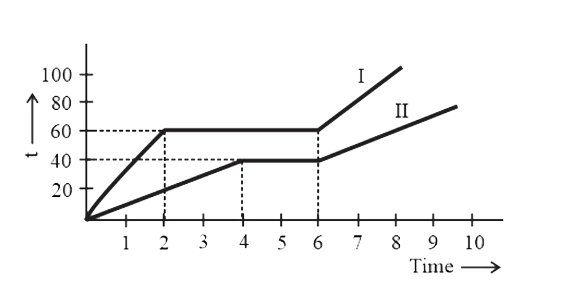During heat exchange, temperature of a solid mass does not change. In this process, heat
in not being supplied to the mass
is not being taken out from the mass
may have been supplied to the mass
may have been taken out from the mass
The correct Answer is:C, D
This situation arises during melting (alternative (c )) or freezing (alternative (d)) of the mass.
Topper's Solved these Questions
- CALORIMETRYBOOK - CENGAGE PHYSICS ENGLISHCHAPTER - CALORIMETRYEXERCISE - Comprehension
30 Videos
- CALORIMETRYBOOK - CENGAGE PHYSICS ENGLISHCHAPTER - CALORIMETRYEXERCISE - Integer
8 Videos
- CALORIMETRYBOOK - CENGAGE PHYSICS ENGLISHCHAPTER - CALORIMETRYEXERCISE - Single Correct
148 Videos
- BASIC MATHEMATICSBOOK - CENGAGE PHYSICS ENGLISHCHAPTER - BASIC MATHEMATICSEXERCISE - Exercise 2.6
20 Videos
- CENTRE OF MASSBOOK - CENGAGE PHYSICS ENGLISHCHAPTER - CENTRE OF MASSEXERCISE - INTEGER_TYPE
1 Videos
Similar Questions
Knowledge Check
Assetion : The temperature of a gas does not change when it undergoes on adiabatic process
Reason: During adiabatic process , heat energy is exchanged between a system and surroundings.AIf both assetion and reason are true and reaasons is the correct expanation of assetionBIf both assetion and reason are tur but reason is not the correct explanation of assetionCIf assertion is true but reason is falseDIf both assertion and reason are false.
Is it possible to increase the temperature of a gas without giving it heat?
OR
Name the process, in which no heat is transfereed to or form a system but the temperature of the system changes.
View SolutionCan heat be added to a substance without causing the temperature of the body of rise? If so does this contradict the concept of heat as energy in the process of transfer because of temperature differece?
View SolutionAt what temperature does a body strip radiating heat ?
View SolutionA cylinder fitted with a piston contains an ideal monoatomic gas at a temperature of 400K. The piston is held fixed while heat ΔQ is given to the gas, it is found the temperature of the gas has increased by 20K. In an isobaric process the same ΔQ heat is supplied slowely to it. Find the change in temperature in the second process?
View SolutionAssertion : For an isothermal process in an ideal gas, the heat obsorbed by the gas is entirely used in the work done by the gas.
Reason : During a process taking place in a system, the temperature remains constant then the process is isothermal.
View SolutionAssertion : During an adiabatic process, heat energy is not exchanged between system and its surroundings.
Reason : The temperature of a gas increases when it undergoes andn adiabatic expansion.
View SolutionTwo bodies of equal masses are heated at a uniform rate under identical conditions. The change in temperature in the two cases is shown graphically. The ratio of their specific heats in the solid state is

View Solution
